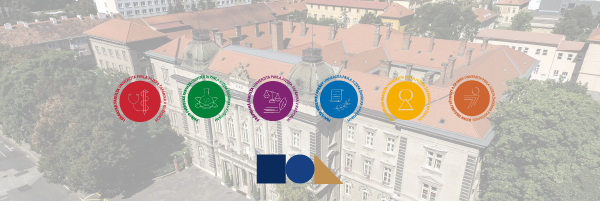The highest degree of our academic milieu was awarded to His Excellency Mr Gianni Buquicchio, the President of the European Commission for Democracy through Law (Venice Commission) in Strasbourg, France, on the basis of the provision 5 of the University Statute and following the proposal of the Academic Board of the Faculty of Law.
The list of precious guests included the President of the Constitutional Court of the Slovak Republic, Ms. Ivetta Macejková, His Excellency, Rudolf Schuster, President of the Slovak Republic, Deputy Chair of the National Council of the Slovak Republic, Ms Jana Laššáková, the first deputy of the General Prosecutor of the Slovak Republic, Mr. Ladislav Tichý, judges of the Constitutional Court of the Slovak Republic, presidents of foreign constitutional courts and their excellencies, members of the diplomatic corps, former rectors of Pavol Jozef Šafárik University in Košice, rectors, vice-rectors, and deans of foreign and Slovak public universities, and members of Academic Senate of Pavol Jozef Šafárik University in Košice.
Mr Gianni Buquicchio was born in 1944 in Bari, Italy. Between the years 1963 and 1967 he studied at the Faculty of Law of the University of Bari and graduated there in 1968, being awarded a doctorate of law for his thesis in Public International Law. The first three years of his career (1968 – 1971) were those of a lecturer at the Institute of International Law and Political Science of the University of Bari, and in 1970 he was also a visiting professor at the Directorate of Legal Affairs of the Council of Europe. Since 1971 he has worked at the Council of Europe at various posts related to Public Law and he was responsible for the Conference of European Ministers of Justice, for the opinions requested by the Committee of Ministers, the Parliamentary Assembly and the Secretary General.
Since 1990, Mr Gianni Buquicchio’s professional life has been linked with the European Commission for Democracy through Law (Venice Commission). As Secretary of the Commission (1996 – 2009), he contributed to its successful establishment and development by ensuring the conception, preparation and ollow-up of projects concerning constitutional reforms and the setting up of democratic institutions within Europe and beyond. In 2009 he was elected President of the Venice Commission and after a successful re-election in 2011 he has held the post. He is a member of the Scientific Council of the “Venice for Research on Peace” Foundation and a member of the Executive Committee of the International Association of Constitutional Law (IACL).
Since 1968, Mr Gianni Buquicchio has conducted lectures and seminars and has taken an active part in conferences dedicated to the activities of the Venice Commission, an independent advisory body of the Council of Europe. The Venice Commission, while working with member states as well as non-member states and international organisations and bodies, has focused on the establishment of legal guarantees for the development of democracy, for supporting the rule of law and for strengthening the acquaintanceship of the member states with each other’s legal systems. The Venice Commission was created by 18 member states of the Council of Europe and today this body consists of 56 European and non-European member States. An important part of the Venice Commission’s activity is also independent research, resulting in studies, opinions and drafts of the standards for the creation of new legal enactments. At the same time the Venice Commission is supposed to provide opinions requested by the bodies of the Council of Europe, its Secretary General or a member state.
Mr Gianni Buquicchio has devoted his life to developing the principles of the rule of law, democracy, humanity and protection of human rights and freedoms. He deserves to be recognized as a valuable and well-known European personality in these fields. The protection and guarantee of human rights and freedoms is one of the elementary attributes of the legal state and it touches the existence of every single individual.















